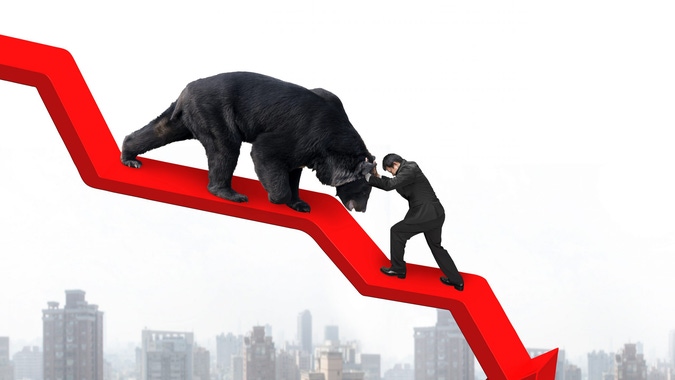[ad_1]
The recent 18% rally for the S&P 500 (SPY) was a flight of fancy. Fed Chairman Powell made sure that message was heard loud and clear from the mountain tops in Jackson Hole. This sets up for an interesting fork in the road where dropping back down the June lows is a very possible outcome. Why is that? And how best to position your portfolio? Investment expert Steve Reitmeister shares his thoughts in the fresh commentary below.

shutterstock.com – StockNews
(Please enjoy this updated version of my weekly commentary from the Reitmeister Total Return newsletter).
Statement of Fact: I am bearish.
Statement of Opinion: I see a 50% chance that stocks will continue breaking bearish below 4,000 to retest the June lows in coming weeks.
And the other 50% chance is that this two week slide for stocks ends here and we continue hanging out in a trading range for the near term.
Why is this the case? And what is the best trading plan?
That will be the focus of this week’s Reitmeister Total Return commentary…
Market Commentary
Back two weeks ago, when stocks were making an assault on the 200 day moving average at 4,328, I proclaimed this to be the end of the bull run. The more likely scenario would be for the market to consolidate under that point and likely chop around in a trading range until investors were sure of their path forward (bullish or bearish).
This has proved to be fairly accurate. That’s because indeed stocks hit the wall at this major resistance level (200 day moving average).
At first it seemed like a modest round of profit taking. But then when Fed Chairman Powell stepped up to the mic in Jackson Hole things got ugly in a hurry.
Here were my thoughts on this vital topic from my Friday commentary as stocks tumbled -3.4% on the session:
“Anyone surprised by Fed Chairman Powell’s speech at Jackson Hole should have their head examined. No two ways about it because the Fed aims for consistency in their messaging. And they have been CONSISTENLY saying that inflation is way too high and they need to be vigilant in fighting that battle.
This absolutely, positively will cause “pain” to the economy. The only question is how much harm it will do. Yes, a soft landing is possible…but recession is more probable.
Thus, for stocks to rally on Thursday into this announcement was crazy. Like “put on a straight jacket” kind of crazy.
The sell off on Friday was a much more sane and logical reaction to the facts in hand. However, the final verdict on soft landing with bull market vs. recession with bear market has not been fully resolved.”
I am not the only one to stress these ideas. Here is what John Mauldin had to say on the subject on his timely piece from over the weekend:
“…I just saw Jerome Powell’s very hawkish Jackson Hole comments. I am simply going to quote some excerpts, while noting that he seems to want to bring on his inner Volcker (emphasis mine, quotes via Peter Boockvar and Axios ).
“”The FOMC’s overarching focus right now is to bring inflation back down to our 2% goal.’
“Our responsibility to deliver price stability is unconditional… There is clearly a job to do in moderating demand to better align with supply. We are committed to doing that job.”
“Restoring price stability will likely require maintaining a restrictive policy stance for some time. The historical record cautions strongly against prematurely loosening policy. ”
“…we must keep at it until the job is done. History shows that the employment costs of bringing down inflation are likely to increase with delay, as high inflation becomes more entrenched in wage and price setting.”
” Reducing inflation is likely to require a sustained period of below-trend growth,” Powell said, according to a prepared text. “Moreover, there will very likely be some softening of labor market conditions.”
“While higher interest rates, slower growth, and softer labor market conditions will bring down inflation, they will also bring some pain to households and businesses. These are the unfortunate costs of reducing inflation. But a failure to restore price stability would mean far greater pain. ”
“We are taking forceful and rapid steps to moderate demand so that it comes into better alignment with supply, and to keep inflation expectations anchored. We will keep at it until we are confident the job is done. ”
John here again. That is the plan. Powell quoted his hero Paul Volcker who said in 1979, “Inflation feeds in part on itself, so part of the job of returning to a more stable and more productive economy must be to break the grip of inflationary expectations.”
He talks a good Volcker, but can he stick to it? If he does, kiss a soft-landing scenario goodbye. The Fed will raise rates until they break something.”
(End of John Mauldin comments…back to Reity)
Since Powell’s speech things have only gotten worse for stocks including three straight closes below the 100 day moving average (4,063). And now today we closed below the psychologically important resistance level of 4,000.
This sets up for a fork in the road, which is why I said in the intro there is 50% odds of heading lower into bear market territory at this time. Or 50% chance stocks bounce in the days ahead to stay in a trading range until more convincing evidence emerges to make them feel comfortable in a long term bullish or bearish stance.
Once again let me clarify that I am bearish. As in downright bearish because high inflation and hawkish Fed equates with recession and bear markets the same way that night follows day.
That thinking made me look like an Honor Roll student back in May and June as stocks broke bearish to new lows at 3,636. But unfortunately for the next 2 months the market rallied unabated making me don the Dunce Cap in the corner of the room 😉
That was then. This is now.
Going back to the 50% chance of just breaking bearish right here and now…the statements by the Fed Chairman Powell were very clear.
Expect a long term battle to fight inflation.
Expect the economy to slow down.
Expect PAIN…like job loss and other economic hardship.
Some investors may not want to wait for the proof of this coming through. And that taking Powell’s word for it is good enough to keep selling stocks expecting a likely recession and extension of the bear market to follow.
This case points to stocks blowing past 4,000 right now…and then beyond the 20% bearish decline line of 3,855…and then to retest the June lows of 3,636 in the not too distant future.
On the other hand…
On the other hand, investors may need more proof of recession to press stocks immediately lower. And so there is a 50% chance that a bounce may form in coming days to get back above 4,000.
Running up another 3% is quite common, but certainly no further than the mighty resistance that would be found at the 200 day moving average of 4,300 (actually I would be shocked for stocks to climb that high right now given the increased negativity).
This bounce would just be a continuation of the consolidation period we have talked about in the past which creates a trading range. And a great visual of a trading range is a tug-of-war.

Bulls on one side and bears on the other expending lots of energy as we chop around in the trading range. But until we seriously break below 4,000 then hard to say bears are back in charge. And conversely, without breaking above the 200 day moving average, currently at 4,300, then can’t say bulls are in charge either.
That’s great. What do we do about it???
When you add this up you understand why my hedged portfolio is still very much in place given the two potential outcomes. Works great if stay in trading range. Works even better if continue to break bearish at this time.
Gladly it is hard to ask for more from a portfolio as we have enjoyed 11 straight sessions in the plus column. Yes, it even generated gains on the up days for stocks as well as the down days.
All in all, our hedged portfolio has gained +3.30% during this hot streak while the S&P 500 has slumped -7.24%.
As the say, “if it isn’t broke, don’t fix it”. And thus we will keep this hedged portfolio strategy in place until some other logics prevails.
For example, if the Fed can truly create a soft landing for the economy, then we will want to get more bullish which means taking profits on the inverse ETF positions and buy more stocks for the eventual return of the bear market.
On the other, more likely, hand…if high inflation and hawkish Fed leads to recession and deeper bear market, then we will do the inverse of the above. That being to sell off the stocks in our portfolio and lean more heavily into the profits generated from the inverse ETFs that will swell in value.
Our plan is sound. Now we just have to see how it unfolds and act accordingly.
What To Do Next?
Discover my hedged portfolio of exactly 10 positions to help generate gains as the market descends back into a bear market territory.
This is not my first time employing this strategy. In fact, I did the same thing at the onset of the Coronavirus in March 2020 to generate a +5.13% return the same week the market tumbled nearly -15%.
If you are fully convinced this is a bull market…then please feel free to ignore.
However, if the bearish argument shared above does make you curious as to what happens next…then do consider getting my “Bear Market Game Plan” that includes specifics on the 10 positions in my hedged portfolio.
Wishing you a world of investment success!

Steve Reitmeister…but everyone calls me Reity (pronounced “Righty”)
CEO, Stock News Network and Editor, Reitmeister Total Return
SPY shares fell $0.04 (-0.01%) in after-hours trading Tuesday. Year-to-date, SPY has declined -15.54%, versus a % rise in the benchmark S&P 500 index during the same period.
About the Author: Steve Reitmeister

Steve is better known to the StockNews audience as “Reity”. Not only is he the CEO of the firm, but he also shares his 40 years of investment experience in the Reitmeister Total Return portfolio. Learn more about Reity’s background, along with links to his most recent articles and stock picks.
The post Are Bears Ready to Push Stocks Back to June Lows? appeared first on StockNews.com
[ad_2]
